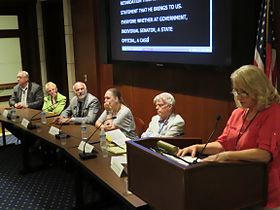Pennhurst State School and Hospital v. Halderman
This article has multiple issues. Please help improve it or discuss these issues on the talk page. (Learn how and when to remove these messages)
|
| Pennhurst State School and Hospital v. Halderman | |
|---|---|
 | |
| Argued February 22, 1983 Reargued October 3, 1983 Decided January 23, 1984 | |
| Full case name | Pennhurst State School and Hospital v. Halderman |
| Docket no. | 81-2101 |
| Citations | 465 U.S. 89 (more) 104 S. Ct. 900; 79 L. Ed. 2d 67 |
| Argument | Oral argument |
| Reargument | Reargument |
| Court membership | |
| |
| Case opinions | |
| Majority | Powell, joined by Burger, White, Rehnquist, O'Connor |
| Dissent | Stevens, joined by Brennan, Marshall, Blackmun |
| Dissent | Brennan |
| Laws applied | |
| U.S. Const. amend. XI; Developmentally Disabled Assistance and Bill of Rights Act of 1975 | |
Pennhurst State School and Hospital v. Halderman, 465 U.S. 89 (1984), was a United States Supreme Court decision holding that the Eleventh Amendment prohibits a federal court from ordering state officials to obey state law.[1]
Background
[edit]The lawsuit was a federal class action,[2] asserting that those with developmental disabilities in the care of the state have a constitutional right to appropriate care and education.[3] Terri Lee Halderman had been a resident of Pennhurst State School and Hospital, and following multiple episodes of abuse, she and her family filed suit in the federal district court. The suit started after Halderman had visited her parents at home and was found to have unexplained bruises. Although the case was not expected to reach the level it did, the courts later found that conditions at Pennhurst were unsanitary, inhumane and dangerous, violating the Fourteenth Amendment, and that Pennhurst used cruel and unusual punishment in violation of the Eighth and Fourteenth Amendments, as well as the Pennsylvania Mental Health and Retardation Act of 1966 (MH/MR).[4] The District Court ruled that certain of the patients' rights had been violated. The District Court decision was the first time that any federal court ruled that an institution must be closed based on a constitutional right to community services.[5][6]

References
[edit]- ^ Pennhurst State School and Hospital v. Halderman, 465 U.S. 89 (1984).
- ^ Halderman v. Pennhurst State School & Hospital, 446 F. Supp. 1295 (E.D. Pa. 1978).
- ^ U.S. District Court, e.D., Pennsylvania. (1977). "Halderman v. Pennhurst State School and Hospital. 23 Dec 1977". Federal Supplement. 446: 1295–329. PMID 11646079.
- ^ "Pennsylvania Mental Health and Retardation Act of 1966" (PDF). Temple University. Commonwealth of Pennsylvania. Archived from the original (PDF) on November 27, 2014. Retrieved January 17, 2016.
- ^ Scott, P.M.; Ferleger, D. (1983). "Rights and dignity: Congress, the Supreme Court, and people with disabilities after Pennhurst". Western New England Law Review. 5 (3): 327–61. PMID 11658602.
- ^ Anti-Institutionalization and the Supreme Court, 14 Rutgers L.Rev. 595 (1983).
Bibliography
[edit]- Court documents
- Law journal analyses
- Boyd, Penelope A. (1981). "The Aftermath of the DD Act: Is there Life after Pennhurst?". University of Arkansas at Little Rock Law Journal. 4 (3). University of Arkansas at Little Rock, Bowen School of Law: 448–466.
- Brant, Jonathan (1983). "Pennhurst, Romeo, and Rogers: The Burger Court and Mental Health Law Reform Litigation". The Journal of Legal Medicine. 4 (3): 323–348. doi:10.1080/01947648309513387. PMID 6605401.
- Brant, Jonathan (1983). "The Hostility of the Burger Court to Mental Health Law Reform Litigation". Bulletin of the American Academy of Psychiatry and the Law. 11 (1): 77–90. PMID 6850110.
- Chemerinsky, Erwin (Summer 1985). "State Sovereignty and Federal Court Power: The Eleventh Amendment after Pennhurst v. Halderman" (PDF). Hastings Constitutional Law Quarterly. 12 (4). University of California, Hastings College of the Law: 643–668. Archived from the original (PDF) on October 16, 2015. Retrieved June 22, 2016.
- Ferleger, David; Boyd, Penelope A. (April 1979). "Anti-Institutionalization: The Promise of the Pennhurst Case". Stanford Law Review. 31 (4). Stanford Law School: 717–752. doi:10.2307/1228423. JSTOR 1228423. PMID 10242374.
- Ferleger, David; Scott, Patrice Maguire (1983). "Rights and Dignity: Congress, the Supreme Court, and People with Disabilities after Pennhurst". Western New England Law Review. 5 (3). Western New England University School of Law: 327–361. PMID 11658602.
- Smith, Peter J. (May 2001). "Penshurst, Chevron, and the Spending Power". Yale Law Journal. 110 (7). The Yale Law Journal Company, Inc.: 1, 187–1, 245. doi:10.2307/797527. JSTOR 797527. S2CID 53607082.
- Journalism
- "Pennsylvania Settles Key Suit on Facilities for the Retarded". New York Times. July 15, 1984. Retrieved November 1, 2016.
- Levey, Noam N. (February 25, 2015). "The Conservative Ruling that Might Save Obamacare". Los Angeles Times. Los Angeles, Cal. Retrieved June 20, 2016.
- McIntyre, Adrianna (March 3, 2015). "Understanding 'Pennhurst': The Legal Doctrine that Could Save Obamacare". VOX. Retrieved June 20, 2016.
- Other sources
- Conroy, James W.; Bradley, Valerie (March 1, 1985). The Pennhurst Longitudinal Study: A Report of Five Years Research and Analysis (Report). Philadelphia, Penn.: Temple University Developmental Disabilities Center. Retrieved November 1, 2016.
External links
[edit]- Text of Pennhurst State School and Hospital v. Halderman, 465 U.S. 89 (1984) is available from: CourtListener Justia Library of Congress Oyez (oral argument audio)
- Suffer The Little Children, a 1968 exposé on Pennhurst State School by NBC10 reporter Bill Baldini.
- United States disability case law
- United States Eleventh Amendment case law
- United States Supreme Court cases
- United States Supreme Court cases of the Burger Court
- 1981 in United States case law
- 1984 in United States case law
- Mental health case law in the United States
- Deinstitutionalization in the United States
- United States Supreme Court stubs
